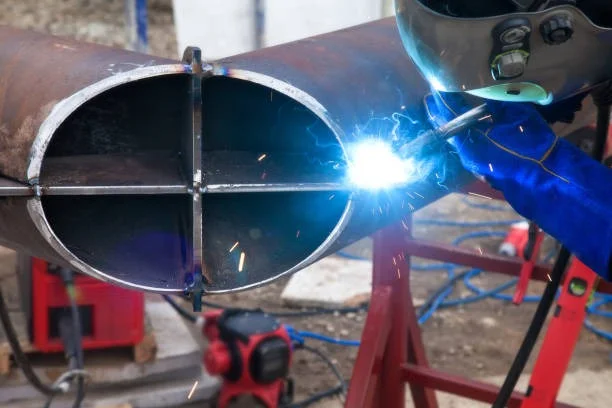HDPE Pipes for Revolutionizing Industrial Infrastructure
In the realm of industrial infrastructure, the choice of piping material plays a vital role in ensuring efficiency, durability, and cost-effectiveness. Among the plethora of options available, High-Density Polyethylene (HDPE) pipes have emerged as a game-changer. HDPE pipes offer a range of advantages that make them an ideal choice for various industrial applications. From their exceptional strength to their resistance to corrosion and chemicals, HDPE pipes in industrial infrastructure have revolutionized the way industries approach their infrastructure needs.

Advantages of using HDPE pipes in industrial infrastructure
One of the primary advantages of HDPE pipes is their remarkable durability. Unlike traditional materials such as steel or concrete, HDPE pipes in industrial infrastructure are highly resistant to corrosion, abrasion, and chemicals. This makes them suitable for industries where the transportation of corrosive or hazardous materials is involved. Furthermore, due to their flexibility, pipes are less prone to cracking or bursting, ensuring long-term reliability and reduced maintenance costs.
Another significant advantage of HDPE pipes is their lightweight nature. This characteristic makes them easier to handle during installation, reducing labor costs and time. Additionally, HDPE pipes boast a smooth internal surface, which facilitates excellent flow characteristics. This translates into reduced energy consumption and increased operational efficiency.
Moreover, HDPE pipes are environmentally friendly. They are made from recyclable materials and have a long lifespan, resulting in a reduced carbon footprint. The high-quality polyethylene used in their manufacturing process ensures that they are resistant to UV radiation, making them suitable for both above-ground and underground installations.
Applications of HDPE pipes in various industries
HDPE pipes have found widespread applications in diverse industries, owing to their unique characteristics. In the water and wastewater sector, HDPE pipes are commonly used for the transportation of potable water, sewage, and industrial effluents. Their resistance to chemicals and corrosion makes them suitable for conveying various fluids in industrial processes.
In the mining industry, HDPE pipes are utilized for the extraction and transportation of minerals, slurries, and mine tailings. The high flexibility of HDPE pipes enables them to withstand ground movements and vibrations, ensuring the integrity of the mining infrastructure.
Furthermore, HDPE pipes have gained popularity in the agricultural sector for irrigation purposes. Their lightweight nature and resistance to UV radiation make them an ideal choice for transporting water to crop fields, ensuring optimal growth and yield.
Key features of HDPE pipes for industrial use
HDPE pipes possess several key features that make them highly suitable for industrial use. Firstly, their exceptional strength allows them to withstand high-pressure applications, making them ideal for industries requiring the transportation of fluids and gases under demanding conditions.
Secondly, the flexibility of HDPE pipes allows for easy installation in challenging terrains or areas with limited space. This adaptability ensures cost-effective solutions without compromising performance.
Moreover, HDPE pipes are known for their excellent resistance to fatigue, impact, and cracking. This makes them suitable for industries exposed to extreme weather conditions or seismic activities.
Additionally, HDPE pipes have a fusion welding capability, which ensures leak-free joints and a seamless pipeline network. This feature enhances their reliability and reduces the risk of downtime or accidents caused by leakage.
Comparison between HDPE pipes and traditional materials
When comparing HDPE pipes to traditional materials like steel, concrete, or PVC, several factors come into play. Firstly, HDPE pipes offer superior chemical resistance, outperforming their counterparts in industries where the transportation of corrosive fluids is involved. This characteristic results in reduced maintenance costs and increased longevity of the infrastructure.
Secondly, HDPE pipes’ lightweight nature provides significant advantages over heavy materials like steel. The ease of handling and installation leads to reduced labor costs and shorter project timelines.
Furthermore, HDPE pipes’ flexibility allows for seamless installation in challenging terrains, eliminating the need for extensive excavation or additional fittings. This adaptability not only saves costs but also reduces the risk of leaks or failures in the long run.
Lastly, HDPE pipes’ recyclability and resistance to UV radiation make them an environmentally friendly choice compared to traditional materials. Their long lifespan and reduced carbon footprint contribute to sustainable industrial practices.
Installation and maintenance of HDPE pipes
The installation and maintenance of HDPE pipes in industrial infrastructure require careful consideration to ensure optimal performance and longevity. The first step in the installation process is the proper alignment of pipes and fittings. This is crucial to avoid stress concentration and potential failures.
During the installation, it is essential to follow industry standards and guidelines, including the correct fusion welding techniques. Fusion welding ensures leak-free joints and a continuous pipeline network. Inadequate fusion welding can lead to leaks, compromising the integrity of the infrastructure.
Case studies showcasing successful implementation of HDPE pipe projects
Numerous case studies highlight the successful implementation of industrial infrastructure projects. One such example is the use of HDPE pipes in the oil and gas industry for the transportation of crude oil and natural gas. The exceptional resistance of HDPE pipes to corrosion and chemicals ensures the integrity of the pipeline network, even in harsh environments. This has resulted in increased efficiency and reduced maintenance costs for oil and gas companies.
Another notable case study involves the use of HDPE pipes in the construction of desalination plants. HDPE pipes’ resistance to chemicals and their ability to withstand high-pressure applications make them the ideal choice for transporting seawater and brine. The durability of HDPE pipes ensures reliable operation and minimal downtime, contributing to the success of desalination projects worldwide.

Important considerations when choosing HDPE pipes for industrial use
When selecting HDPE pipes for industrial infrastructure use, there are several important considerations to keep in mind. Firstly, it is crucial to assess the specific requirements of the industry and the application in question. Factors such as the type of fluid or gas to be transported, the operating conditions, and the expected lifespan of the infrastructure play a significant role in determining the appropriate HDPE pipe specifications.
Secondly, the quality of the HDPE pipes and fittings should be thoroughly evaluated. It is essential to source the materials from reputable manufacturers who adhere to international standards and certifications. This ensures the reliability and longevity of the infrastructure.
Additionally, proper installation techniques and fusion welding methods should be followed to guarantee leak-free joints and a seamless pipeline network. Training and certification of personnel involved in the installation and maintenance processes are crucial to ensure compliance with industry best practices.
Future trends and advancements in HDPE pipe technology
The future of HDPE pipe technology holds promising advancements that are set to further revolutionize industrial infrastructure. With ongoing research and development efforts, manufacturers are continuously improving the properties and performance of HDPE pipes.
One area of focus is the development of higher-strength HDPE pipes, capable of withstanding even higher pressures and temperatures. This will expand the range of applications for HDPE pipes, particularly in industries requiring extreme conditions.
Furthermore, advancements in fusion welding techniques and jointing methods will enhance the reliability and efficiency of HDPE pipe installations. Innovations in inspection and monitoring technologies will enable real-time data collection, facilitating predictive maintenance and minimizing downtime.
Moreover, the integration of smart technologies, such as sensors and data analytics, will enable the monitoring and management of HDPE pipe networks in real time. This will optimize operations, reduce water or energy wastage, and enhance overall performance.
Conclusion: The role of HDPE pipes in revolutionizing industrial infrastructure
In conclusion, HDPE pipes have emerged as a revolutionary solution for industrial infrastructure needs. Their numerous advantages, including durability, chemical resistance, flexibility, and environmental friendliness, make them an ideal choice for a wide range of industries.
The successful implementation of HDPE pipes in various case studies demonstrates their effectiveness in improving efficiency, reducing maintenance costs, and ensuring the integrity of industrial infrastructure.
As industries continue to evolve and seek innovative solutions, the future of HDPE pipe technology holds exciting prospects. With advancements in strength, jointing methods, inspection technologies, and smart integration, HDPE pipes are set to play an increasingly significant role in revolutionizing industrial infrastructure worldwide.

In the realm of industrial infrastructure, the utilization of HDPE pipes represents a paradigm shift towards efficiency, durability, and sustainability. As industries evolve and seek innovative solutions to meet their growing needs, HDPE pipes emerge as a revolutionary choice. Their exceptional properties, including durability, chemical resistance, flexibility, and environmental friendliness, make them an ideal solution for a wide range of industrial applications. With advancements in technology and ongoing research efforts, the future of HDPE pipes holds exciting prospects for further revolutionizing industrial infrastructure worldwide. By embracing HDPE pipes, industries can pave the way for enhanced efficiency, reduced maintenance costs, and sustainable practices, contributing to a greener and more resilient future for industrial development. Trust in HDPE pipes to drive innovation and excellence in industrial infrastructure, ushering in a new era of reliability and performance.
Frequently Asked Questions About HDPE pipes in industrial infrastructure
Q1: How can HDPE pipes revolutionize industrial infrastructure?
A1: HDPE pipes bring a revolutionary change to industrial infrastructure by providing a durable, corrosion-resistant, and versatile solution for various applications, ensuring long-term reliability.
Q2: What specific industrial applications are HDPE pipes suitable for?
A2: HDPE pipes are suitable for a wide range of industrial applications, including chemical processing, conveyance of abrasive materials, wastewater treatment, and industrial water supply.
Q3: How do HDPE pipes contribute to the efficiency of industrial processes?
A3: HDPE pipes contribute to efficiency by offering smooth, corrosion-resistant surfaces that minimize friction and reduce the likelihood of clogs, ensuring a more reliable industrial process.
Q4: Can HDPE pipes withstand the harsh conditions of industrial environments?
A4: Yes, HDPE pipes are designed to withstand the harsh conditions of industrial environments. Their resistance to corrosion and chemical reactions makes them well-suited for industrial applications.
Q5: How do HDPE pipes support sustainable practices in industrial infrastructure?
A5: HDPE pipes support sustainability by being recyclable, minimizing environmental impact, and promoting efficient industrial processes through their durability and resistance to leaks.
Q6: Are HDPE pipes suitable for conveying aggressive chemicals in industrial settings?
A6: Yes, HDPE pipes exhibit excellent chemical resistance, making them suitable for conveying aggressive chemicals commonly found in industrial settings.
Q7: What role does the flexibility of HDPE pipes play in industrial infrastructure?
A7: The flexibility of HDPE pipes allows for easy installation around machinery and structures, reducing the need for extensive fittings and promoting efficient layout in industrial facilities.
Q8: How can HDPE pipes enhance safety in industrial infrastructure?
A8: HDPE pipes enhance safety by reducing the risk of leaks and failures. Their fusion-welded joints provide a secure and leak-free system, ensuring a safer working environment.

